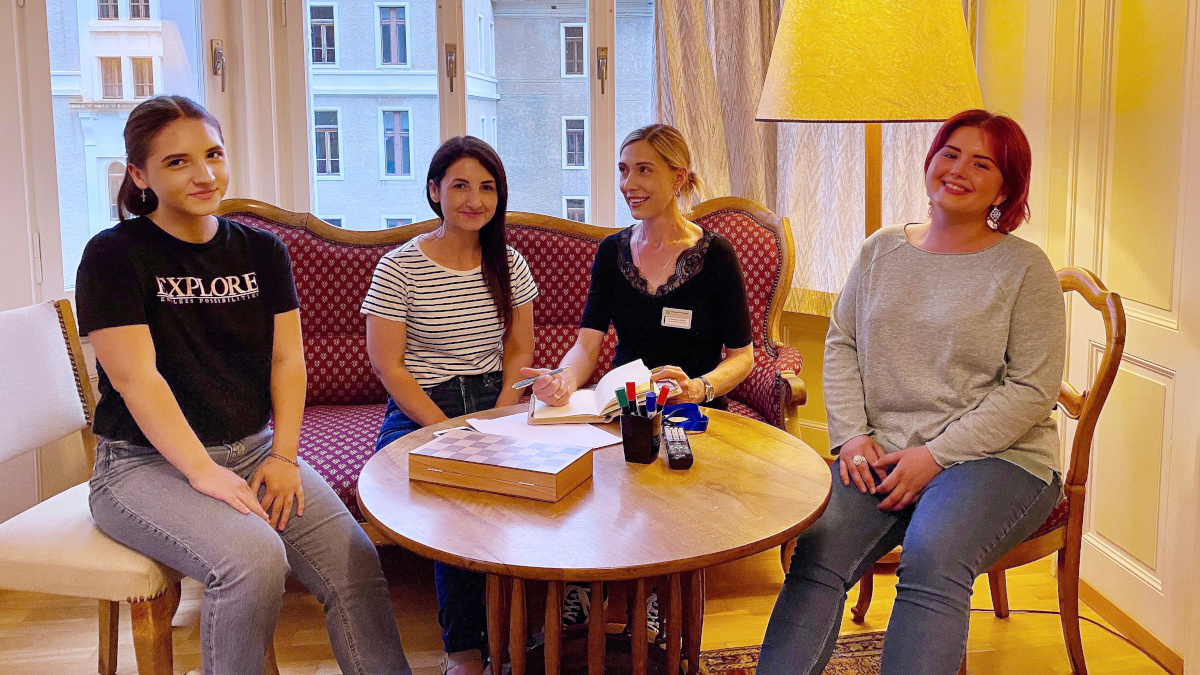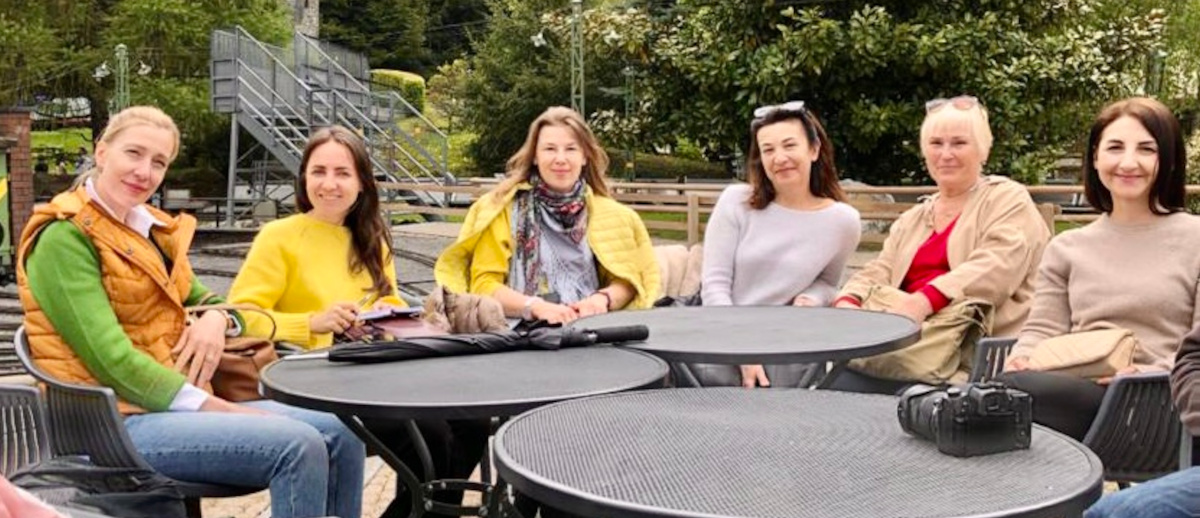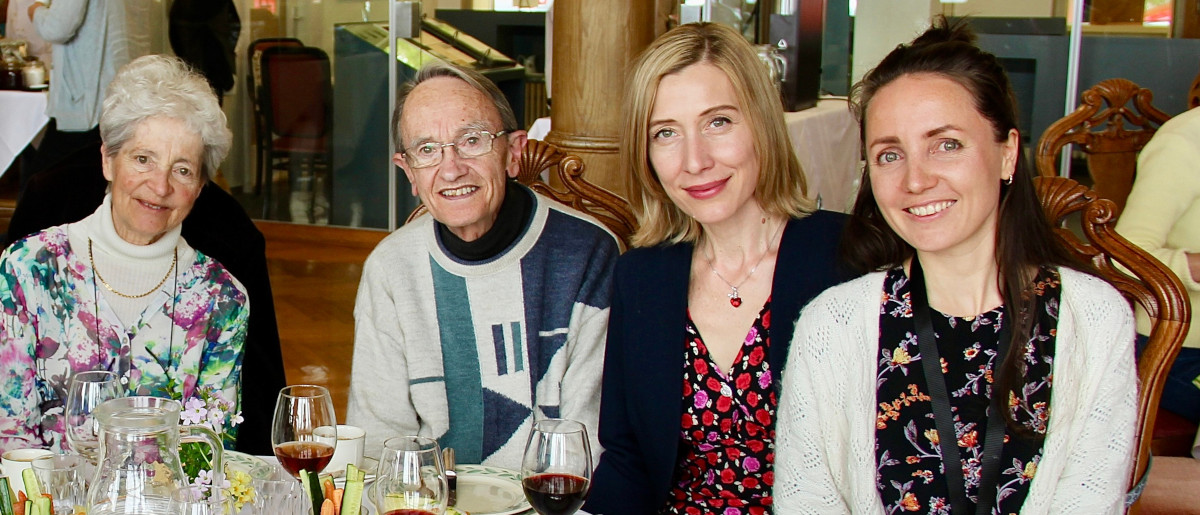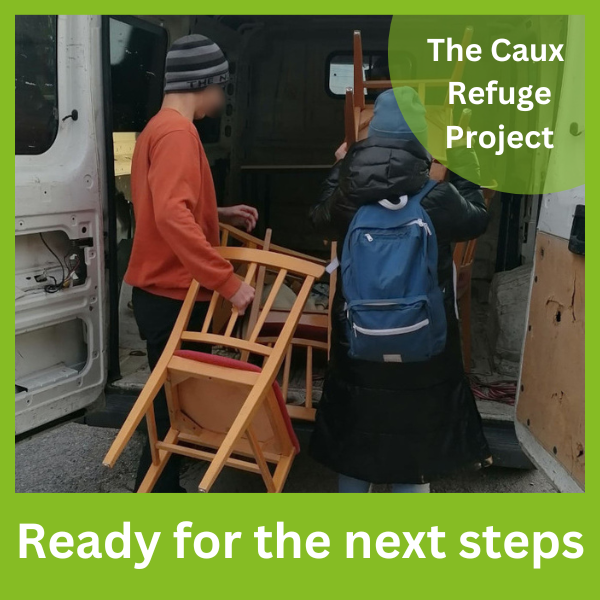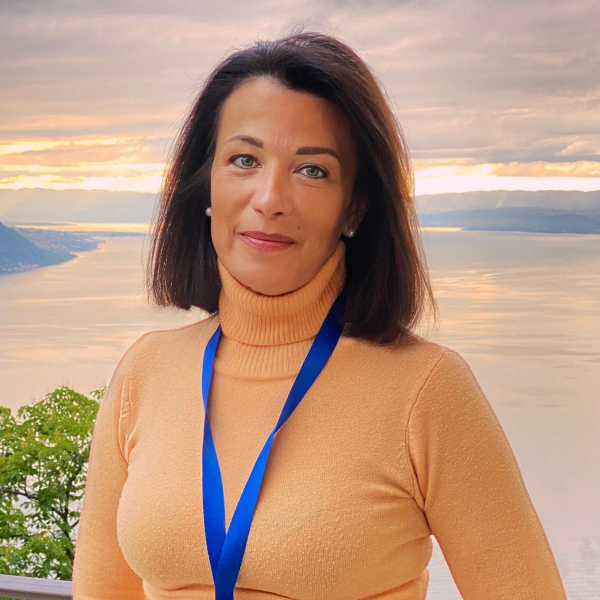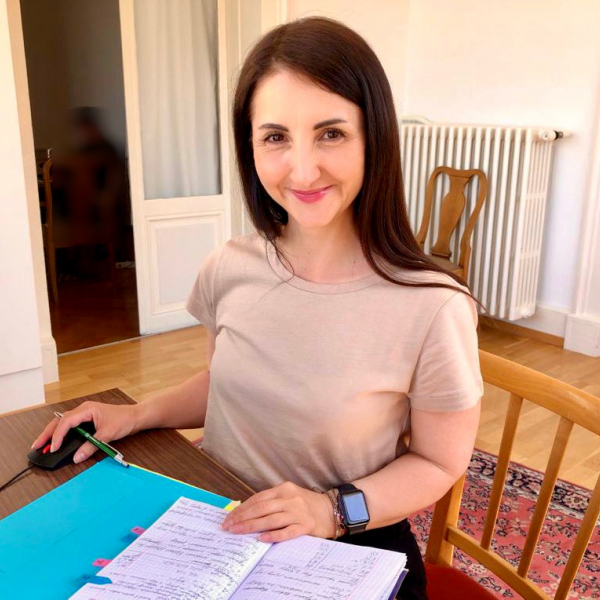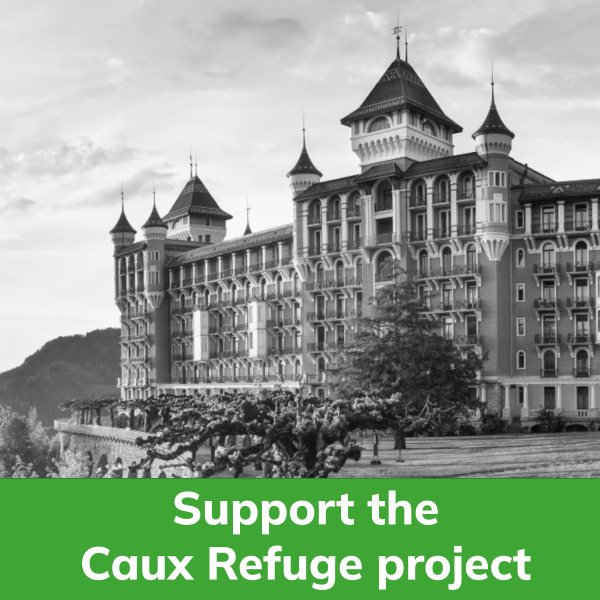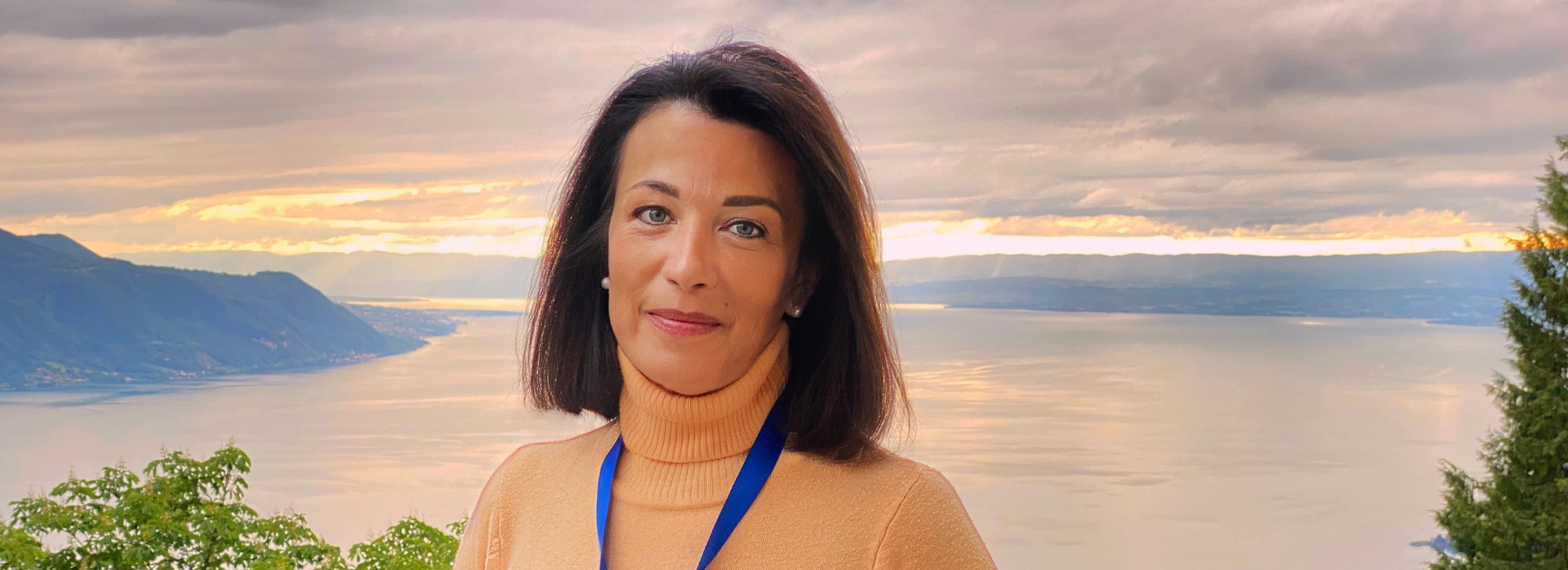'If it wasn’t already my job, I would probably be doing it anyway.'
A Caux Refuge interview by Anastasia Slyvinska
01/06/2022
This article is the fifth in a series of interviews with people living or working at the Caux Refuge, based at the Caux Refuge.
_______________________________________________________________________________________________________________________
Maria Raffin is originally from Moldova, but has been living in Switzerland for 17 years, two of which in the village of Caux. A neighbour to the Caux Palace, she very quickly stepped in to support the Caux Refuge project and help those who have been coming to stay there since the beginning of the war in Ukraine. First a volunteer, she has been working as a liaison officer for the Caux Refuge since April, sharing the position with her colleague, Ekaterina Gross.
How did you first hear about the Caux Refugee project and how did you meet the first people who came?
Maria: I heard about it through our neighbour, Amandine. She added me to an online group called “Solidarity” where people from the village started to gather essentials and prepare the Villa Maria for those who had to leave their homes due to the war in Ukraine. Alina was the first person I met at the Villa Maria. I had come with two bags of chocolates, food and essentials. Then I met Tetiana. Amandine told me that Tetiana had come with her three children and later Olena and her stepdaughter Masha arrived.
So you started to help people as a volunteer?
Maria: Yes, at first it wasn’t an official job. I didn’t even think that helping people the way I helped could be considered a job, so it was a complete surprise for me when I was offered a part-time position with IofC Switzerland as a liaision officer at the Caux Refuge project. For me, helping people in such difficult circumstances is absolutely normal, as nobody knows what situation we could be in tomorrow. My husband Alessandro has helped a lot. He supported me from day one and has started so many initiatives. Without his kindness and encouragement it would have been very difficult for me to embark on this journey, so I’m truly thankful to him.
Is there some personal motivation that stands behind your commitment?
Maria: Well, I’ve gone through situations in the past where I needed help. And only a few people helped me at the time because others didn’t really know what was going on. I was too shy to ask for support. When you’re in a foreign country and you don’t know anyone, it is obviously not easy to ask for help because you’re a stranger to everyone. But when someone helps you at such a time - we have a saying, “Your wings grow”. It means that you are being empowered and you gain motivation and hope. This really means a lot. I have never forgotten those moments when strangers helped me. I think we should all help each other in difficult situations.
So for you it’s a sort of giving back to others?
Maria: In some way, yes… I’ve had a difficult life since I was little. When you need help and nobody is around - that’s hard. So when someone, even just one single person, is being kind and supportive you feel that not everything is bad forever. With time you realize that you don’t need a lot to feel good and fulfilled. It’s very important to have good people around you, food, shelter, but the most important among all is health. Everything else can and will get better.
And what touched or impressed you the most during these few months at the Caux Refuge?
Maria: It’s those absolutely innocent people who had everything before the war…a home, a family, health, work and everything else they needed. Suddenly they had to leave it all behind, leave everything they loved and go somewhere, not even knowing where to or who was waiting for them. They didn’t even know if they would make it through their journey. Obviously, it’s a very hard situation when you don’t know where you’re going and what awaits you there. On top of that, you feel you can’t be demanding, you can’t even expect anything. It’s hard to ask for help. In this case they even had to ask for very basic essential things, like where to sleep at night or what to eat.
Do you also work with children and elderly people at the Caux Refuge?
Maria: Yes, indeed! It’s one thing when people are adults, but we have kids and elderly people who had to flee and are now staying at the Villa Maria. People like Anna and Liudmyla who have worked their entire lives to have a pension and live in peace. And then they had to leave, right when they thought it was finally time for them to take a break and take care of themselves… Can you imagine that? To me, that’s heartbreaking. But I think all of them are lucky to have found a safe place here in Caux.
And what is the most important thing for your work? What are your top priorities?
Maria: It’s helping people to adapt to new circumstances, all while making them feel at home. I’m not sure I can help them with everything. I can’t stop this war, but whatever is within my power I will do it. There is no doubt about that. Even if it wasn't already my job, I would probably be doing the same thing and take as much time as possible to help these people.
And how did you find this job and decided to make this a career choice?
Maria: I didn’t know there was a job opening, so I was surprised when I got a job proposal. But I immediately agreed because I like the fact that I learn a lot every single day. First of all, I learn a lot about people and their relationships. It’s very interesting for me to see how IofC is helping people and I’m curious to find out more. It all has a sense of meaning to me.
What have been the most meaningful and beautiful moments during your work at the Caux Refuge?
Maria: It’s almost impossible to name just a few. When I think of my experience at the Villa Maria I consider every moment and conversation ultimately meaningful. Even if I would sort through them and lay out all the different moments on a shelf I wouldn’t be able to decide. Each and every moment here is beautiful to me, starting from the introduction, our first dinner at our family home, celebrating Easter… Right now we are planning to do a barbecue. There are many more moments to come and I look forward to experiencing them together. So I am very thankful to Amandine, my volunteering neighbours in Caux and IofC who have all made this project possible.
About the author
Anastasia Slyvinska is a journalist from Kyiv, Ukraine. She has worked as a TV host, a foreign reporter and a manager for media outlets in Ukraine and abroad. Having worked at both Ukrainian and Canadian Parliaments she combines her media expertise with her political sciences background, holding a MA in Political Science. Anastasia has been part of the IofC community since 2014 when she first participated at the conference Just Governance for Human Security. She is currently living in Lausanne, Switzerland.
YOU CAN HELP!
As our own sources of funding are running out, we need your help to support the Caux Refuge project financially. We need CHF 20,000 to ensure that the group can be hosted until the end of 2022. We will use these funds to finance food aid and other costs related to the group's stay at the Villa Maria in Caux.
We thank you for your support. Please pledge your support here and specify “Caux Refuge” when making your contribution. If you have any proposals and questions, please get in touch with us.

Please note that the opinions expressed in these articles are those of the interviewees and not do not necessarily reflect the opinion of the interviewer and Initiatives of Change Switzerland.
Photo top: Anastasia Slyvinska
A family split between Ukraine, Germany and Switzerland
A Caux Refuge interview by Anastasia Slyvinska
24/05/2022
This article is the fourth in a series of interviews with people affected by the war in Ukraine who have found temporary shelter at the Caux Refuge.
_______________________________________________________________________________________________________________________
As the war in Ukraine has been raging for 3 months, Oksana Stelmakh, a nurse from Kharkiv, reflects on how the current situation has impacted her family, now scattered over three different countries. Since her arrival in Caux early April she and a friend have been staying at the Caux Refuge, slowly taking steps into a new future.
Oksana, you arrived at the Caux Refuge on 3 April 2022. Were did you go first when you realized it was necessary to leave Kharkiv?
Oksana: When we left Kharkiv at the beginning of March we went straight to Kremenchuk, approximately 250km from our hometown. That was on the second or third of March. At first we planned to go to Western Ukraine but finally stayed in Kremenchuk because it was quiet there. Friends helped us to find a very nice place to stay and the locals there were very kind to us. At that point we were still sure that everything would be over soon and we would be able to come back to Kharkiv.
And then you realized that the situation escalated further?
Oksana: Yes, the situation only got worse after we left Kharkiv. During that period, Liuba called me. She is a friend and colleague of mine and we have known each other for many years. It was a rescue call, as it turned out later. Her daughter had worked with Initiatives of Change in the past and was trying to evacuate her mom to Caux. Liuba, considering her age, asked if I would be willing to accompany her.
But that meant separation from your son, daughter and son-in-law.
Oksana: Yes, it did. So I refused point-blank. I was hoping to be with my kids. If they stayed in Kharkiv - I would stay in Kharkiv. When we left we had five minutes to gather our belongings and I was ready to leave with them. But I mentioned Liuba’s proposal to my daughter and her husband that day.
And how did they react? Did they object?
Oksana: No, not at all, they actually said that I should definitely go and that they would be more at peace. Knowing I would be safe in Switzerland also meant they would have more space for manoeuvres and more mobility. It wasn’t an easy decision.
So at first you all decided to stay in Kremenchuk?
Oksana: Yes, at that time we were all still in Kremenchuk. We expected to stay there as long it would remain quiet there. We realized the situation could get worse but at least we could all jump straight into our cars and leave. There was quite a crowd of us, including my son-in-law’s parents and their two grandchildren as their daughter had already left Ukraine before the war and gone to France. So they planned to take the kids to their mom somehow.
So did they manage to evacuate together with their grandchildren?
Oksana: Yes, but in the end they went to Germany as their daughter had found a job there and speaks better German than French. She lives far from my daughter who is also in Germany now, but on the opposite side of the country. But at least they are in the same country.
Is it your first time in Caux? What were your first impressions of this place?
Oksana: I have never been to Caux before. It’s extraordinary. The beauty of this place is truly breathtaking. But I can’t help compare things to Ukraine, to our Crimea. I spent a lot of time there in my youth. It’s very beautiful and such comparisons always make me cry. (weeps)…I’m sorry.
Are you often in touch with your dear ones who stayed in Ukraine?
Oksana: Of course, we have a big family there. It’s the fourth or fifth generation who has been living in the same house since 1927. My grand-grandparents bought it and we still live there. That kind of inheritance is much more common in Western Ukraine or some villages. Our family is rare or maybe even unique in that regard in Kharkiv.
Are they all still in Kharkiv now?
Oksana: One of my cousins went to Poltava but she is already planning to come back to Kharkiv soon and another cousin never left Kharkiv. My 82-years old aunt also stayed. Of course, we are calling each other very often. Particularly with my son, he’s very much on his own in this situation so we chat even more often than we call each other.
Does your daughter plan to visit Caux?
Oksana: Yes, my daughter and her family visited me on the weekend before the Orthodox Easter for a couple of days. I was very happy to see them at last even though it was such a short visit. I will go and visit them in Germany as soon as they have an opportunity to host me. But I also realize that they have so many things to do and organize. They are starting everything from scratch in a new country. But my son can’t leave Ukraine for now so my biggest wish now is to see him!
And how does your daughter and her family feel in Germany?
Oksana: I have the impression it’s quite difficult. At first, my daughter was crying all the time, everything just felt bad, everything is so different from Ukraine. She just wanted to come back home. They attend intensive German classes every day. And dealing with German bureaucracy also takes time, of course.
For all of you the situation is completely new. How are you living through this?
Oksana: It is very difficult. My daughter told me that if she won’t be able to find a job in Germany she will try and go back home at the first opportunity. My job situation back home in Kharkiv is also very uncertain. I used to work as a nurse in a small clinic before the war broke out but I don’t know if there will be a job for me left when come back. Right now I send out appplications for jobs here in Switzerland. Our liaison coordinator Katia at the Caux Refuge is helping me with that, but it takes time. And language is crucial.
Have you already started French classes?
Oksana: I study with Eliane, our neighbour, with a group in Clarens and online. It’s intense. But I also realize that I can’t learn a new language in a month, not at my age. But I could look after ill people in clinics and at home as such care does not require advanced language skills. It’s all difficult but I still feel supported.
And what keeps your spirit high in such overwhelming times? You are still always so active, positive and smiling.
Oksana: I think that’s generally my character anyway. I wouldn’t say that I have had a difficult life and I am used to dealing with everything on my own. I divorced early and had to take care of our family during the huge 1990s crisis in Ukraine. And it’s good to always keep busy. That’s vital, otherwise you’ll most certainly get the blues.
And Liuba, with whom I travelled to Caux, is such a kind person. Friendship is integral when it comes to living through harsh times. It would be much harder if I were here on my own. With Liuba, I can discuss everything and it’s also comfortable just staying silent with her. She’s very understanding and I wish everyone had such a friend.
In spite of everything, what gives you hope for the future?
Oksana: You know, everything is changing. Nothing is permanent. Nothing can last forever. The curve has gone down so drastically that it means at some point it should go upwards as drastically again! I’m absolutely convinced and have trust in this.
About the author
Anastasia Slyvinska is a journalist from Kyiv, Ukraine. She has worked as a TV host, a foreign reporter and a manager for media outlets in Ukraine and abroad. Having worked at both Ukrainian and Canadian Parliaments she combines her media expertise with her political sciences background, holding a MA in Political Science. Anastasia has been part of the IofC community since 2014 when she first participated at the conference Just Governance for Human Security. She is currently living in Lausanne, Switzerland.
YOU CAN HELP!
As our own sources of funding are running out, we need your help to support the Caux Refuge project financially. We need CHF 20,000 to ensure that the group can be hosted until the end of 2022. We will use these funds to finance food aid and other costs related to the group's stay at the Villa Maria in Caux.
We thank you for your support. Please pledge your support here and specify “Caux Refuge” when making your contribution. If you have any proposals and questions, please get in touch with us.

Please note that the opinions expressed in these articles are those of the interviewees and not do not necessarily reflect the opinion of the interviewer and Initiatives of Change Switzerland.
Hani Abou Fadel
Hani Abou Fadel began embarking his journey into becoming a changemaker when he began developing a passion for history, geography, politics, philosophy and cultures at the age of 12. This eventually led to him to obtain a Master in Global Studies from Lund University with a main focus on climate change and its politics, gender studies, postcolonialism, and Global South politics. Hani was diagnosed with Asperger Syndrome when he was 7 years old. Although this meant many struggles while growing up he eventually became a changemaker.
Nuhu Abdulmalik
Nuhu Abdulmalik is a trained educator, graphics designer, video editor, photographer, actor, radio drama script writer and producer and loves creativity and innovation. Nuhu believes in teamwork and is convinced that friendship is a lubricant that smoothens interpersonal relationships.
Mastora Ali
Mastora Ali is from Afghanistan and an undergraduate student at Asian University for Women (AUW) with a major in Philosophy, Politics and Economy. She has been working as a volunteer for the Women Association and mainly focused on supporting business women to provide them loan money. She established a History Club at AUW implementing new methods and encouraging students. She is a mentor at CBA organization, has been working for the Aga Khan Foundation, which mainly focuses on empowering women and girls to build their capacity in the job market.
Shrouk Hussien
The CEO and founder of the non-profit mental health initiative Yellow vs Blue, Shrouk Hussien is a certified NLP Associate Practitioner, working as a project manager and as a consultant in the Global Inclusion area. She is also an editor with a UK-based magazine, a mentor with MCWGlobal, and a certified Erasmus+ facilitator and coach.
Ahmed Abdelsalam
Ahmed Abdelsalam is 26 years old and from Egypt. He is a student, learner, educator, facilitator and storymaker, striving for quality.
Ines Mokdadi
Ines Mokdadi is a University Agrégée Professor of English at ISEAH in Tunisia and specializes in Applied Linguistics. Her research focuses on critical discourse analysis and power dynamics. She also works as a freelance translator and interpreter and has served as a Fulbright Foreign Language Teaching Assistant (FLTA) Alumna at the University of Notre Dame, USA (2020-2021). In addition to her academic and professional pursuits, Ines is deeply passionate about civic engagement, inclusion, and cross-cultural understanding.
Nourhan Badr El-din
Nourhan Badr El-din is a nomadic seeker in life from Alexandria, Egypt. She loves art and science and is part of the organizing team of the Creative Leadership conference, helping out the content, workshops, dialogue, and partnerships. NBourhan is a believer in the power of storytelling as a means for healing. She has been a facilitator with Initiatives of Change and Soliya since 2019 and is also a future thinking fellow with UNDP and the Global Swarm think tank. Nourhan's background is in economics, marketing and HR.
